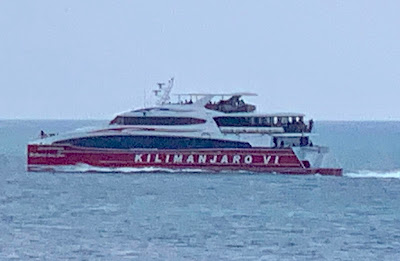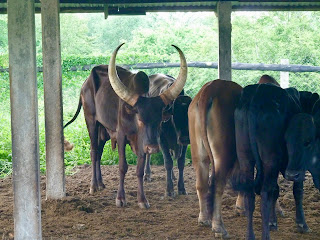16th - 22nd Nov 2020
 |
| One of the twin-hulled fast ferries to Dar-es-Salaam |
I have now been in Zanzibar and mainland Tanzania for 6 weeks and am still enjoying the relaxed pleasant lifestyle here. I have met up with several 'escapees' from other countries which have extraordinary 'covid' restrictions. None of us can understand why a bug from which well over 90% of those who catch it suffer merely a cold, cough, sniffly nose, or nothing at all, has resulted in populations becoming so supine in their subjugation to these draconian and often utterly illogical rules and regulations which are so damaging to social life, the economy, psychological welfare and other unrelated health issues. The fact that so many otherwise robust people are still keen to cower behind their (arguably) useless dehumanising face-masks (not here, I hasten to add, and with no dire consequences), fuels and spreads unnecessary anxiety. 'Covid wimps' as I've heard them mockingly described! From the outside it all looks as if the world has gone stark raving bonkers and, despite a vaccine, no end in sight to this madness.
Left: Part of the packed economy class section on the fast modern twin-hulled ferry, a 1½ hour journey from Zanzibar to 'Dar' (that is the common abbreviation for Dar-es-Salami).
There are 4 ferries daily. The waiting hall at departure was full for the mid-day run. Economy class (price for foreigners $35; much cheaper for locals). Right: The economy class was full to the point of people sitting on the stairs.
For an extra $15 you can travel in VIP Class, which was almost empty. Here you get good WiFi, comfortable seat and a complementary cup of coffee and bun served to your seat. I splashed out for this. There is also a 'Super-VIP' class, but not sure what 'extras' that gave you.
Right: Looking back at the frontage of the luxury Park Hyatt hotel on the point of Stone Town. Not a patch on Bottoms Up I'm sure.
I had booked in, on spec, to a hotel for the first night in Dar. It was within easy walking distance from the ferry terminal. It is called 'The Chelsea Hotel' and, at $23 pn, was great value. Comfortable air-con room, big TV, good bathroom and excellent bar and restaurant, plus a very helpful Indian manager. I merely mention this in case anyone reading this is looking for accommodation in Dar.
My host owned (or rather 'leased', because you can't legally own) a 350 acre farm a 2½ hour drive north-west of his house. This bordered a large river and he farmed cattle and goats in an innovative and modern (by African standards) style by encouraging a form of rotational grass husbandry. Grass growing is the key to success. To get to the place involved driving through some boggy, bumpy tracks, impassable during a rainy period, and struck me as being very hard work!
His manager was Tanzanian and the 'herders' were, predictably, Maasai.
Left: A daily count of the cattle. They are all branded but cattle rustling can be a problem.
I have discovered the Maasai (Maa) word for "hello". It is "subai", pronounced "soub eye". The response is "Eba". Could come in useful?
Right: Counting the goats. They keep giving birth so hopefully increasing the population. They are also prone to dying of one disease or another which means that the status quo is probably maintained.








Hello Matthew. We are enjoying your blogs and I am excited to have been pictured with the turtles. Ha ha. If you still want a safari i can recomend Godsons peak2peak adventures. Try them out on tripadvisor!. Carol
ReplyDeleteThanks Carol! Hope you have been enjoying some diving.
ReplyDelete